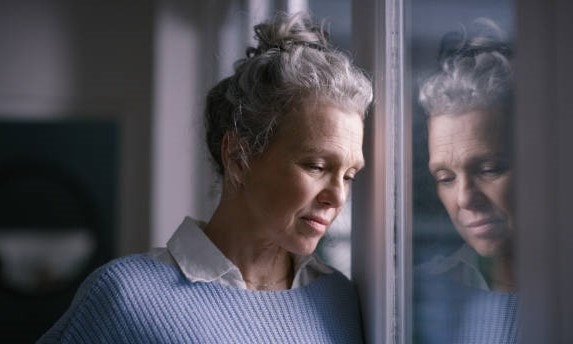Probiotics for Depression
With an increase in awareness of mental health issues and demand for mental health services within healthcare systems, what part can probiotics play?
- What is depression?
- Link between gut health and depression
- Which is the best probiotic for depression?
- Are probiotics good for depression?
- Key takeaways
What is depression?
We often hear people refer to themselves as being depressed but there is a difference between experiencing a low mood and depression. Depression is a mental health illness with the NHS describing it as more than simply feeling unhappy for a short period of time but feeling persistently sad for weeks or months1. It is a complex condition with a wide variety of symptoms that are associated with depression including feeling tired constantly, being uninterested in things that are usually enjoyed, tearfulness and loss of appetite. Current treatments tend to include antidepressants and talking therapies but there can be long waiting times for patients needing to access mental health support. In this article we will be exploring whether there is a role for probiotics as a supplement, in helping the success of these treatments. And establishing if we can identify what are the best probiotics for depression.

Link between gut health and depression
We know that there is a direct physical link between the brain and the gut in the vagus nerve, and that there is two way communication between the brain, gut and the microbiome, the brain-gut-microbiota-axis2 Logically, this would imply that the health of the microbiome and overall gut health could influence mental health, including depression, and that mental health can affect the gut microbiome but what does the research show us? In the future could we be using probiotics for depression?
To understand how probiotics could help with depression we need to understand the functions of the microbiome. It is known that the microbiome produces neurotransmitters including GABA and serotonin, and an increase in serotonin has a positive effect on mental health which is why SSRI’s, which upregulate levels of serotonin in the brain, are one of the treatments for depression. Additionally, bacteria including Lactobacillus, Bifidobacterium and Escherichia, have been found to generate neuropeptides, which are proteins that activate receptors in the brain used for neuronal signalling.
Our gut microbiome also produces short chain fatty acids, SCFA’s, including butyrate, which has a key role in promoting neuronal plasticity and promoting memory. The SCFAs that bacteria produce, acetate, hexonate, propionate and the aforementioned butyrate, have anti-inflammatory properties which is important as there is an increase in inflammation seen in patients suffering with depression12 .The degree of inflammation has shown to have an impact on the success of treatment, patients who have lower levels of inflammation have more improvement than those with high levels of inflammation.
Find out more in Could prebiotics help with anxiety.
Which is the best probiotic for depression?
From the studies can we establish which are the best probiotic strains for depression? We can see that they all use different combinations of probiotics but a key feature is that they all include Lactobacillus and Bifidobacterium species. From this we can conclude that a balanced probiotic formula that includes these types of bacteria will be beneficial as an adjunct to treatment for depression. If we were to look at supporting overall mental health which has stress as an underlying cause, a systemic review of probiotics and IBS and the gut-microbiota highlighted the combination of Lactobacillus acidophilus Rosell-52 and B. Longum-175 as being successful in relieving gastrointestinal symptoms that are stress related 6 in addition to symptoms of depression.
A study from McMaster University in Ontario examined the effects of probiotics on individuals with both irritable bowel syndrome (IBS) and mild to moderate anxiety or depression14. Researchers divided 44 participants into two groups, with one receiving the probiotic strain Bifidobacterium longum NCC3001 and the other a placebo. After six weeks, psychological evaluations showed that 64% of the probiotic group experienced a significant reduction in depression scores, compared to just 32% in the placebo group. MRI scans confirmed that these mood improvements were linked to changes in brain activity associated with mood regulation.
Dr. Premysl Bercik, one of the study’s authors, suggested that probiotics could be a promising treatment not only for gut-related conditions but also for mental health disorders. While the study was small, it supports the growing evidence that the gut microbiome plays a key role in emotional well-being. As research progresses, probiotics may become a valuable tool for managing stress, anxiety, and depression naturally.
Are probiotics good for depression?
A recent, randomised double blind study by King’s College3, London took 50 outpatients who had a primary diagnosis of MDD (Major Depressive Disorder) combined with a Hamilton Depression Rating Scale score greater than 13. Antidepressants were being taken by all participants and they were not allowed to make changes to this during the study. They were split into a placebo group and a probiotic group who received 4 capsules daily of probiotic (2 × 109 colony-forming units per capsule). The probiotic contained 14 species of probiotics. The results showed that depressive symptoms improved in both the placebo and probiotic group, however, the probiotic group demonstrated a greater reduction in depressive symptoms from week 4, suggesting a role for probiotics as an adjunct treatment to antidepressants.
Another study from Switzerland was a double-blind RCT of a probiotic add-on therapy for four weeks in depressed patients.4 The patients were given a probiotic containing eight strains of probiotics at a dose of 900 billion CFU/day or a placebo. The results showed that patients receiving the probiotic supplement had an increased abundance of Lactobacillus with the researchers stating that this increase could be the reason for the antidepressant effect observed in the patients, due to the known effects of Lactobacillus including the production of GABA and reducing anxiety and stress-induced corticosterone. In conclusion the research demonstrated the benefit of probiotics as an adjunct to treatment for depression with an emphasis on the importance of compliance during probiotic supplementation.
A study in American University students with suicidal thoughts looked at the role of the oral-gut-brain axis, in particular the diversity of the oral microbiota and the influence it may have on neurological and systemic disorders either directly or indirectly5. We are excited to see further studies on this area of research.
Additionally, a small study run by psychologists Laura Steenbergen and Lorenza Colzato in 2015 found positive associations with a multi strain probiotic and participants negative thoughts15. The researchers gave 20 healthy participants a multi strain probiotic every day for four weeks and the other 20 participants received a placebo. The participants filled out a questionnaire assessing sensitivity to depression at the beginning and the end of the month. More specifically this questionnaire was looking at ‘rumination’ which is the persistence and repetition of negative thoughts. Outcomes of the study found that compared to subjects who received the placebo, participants who received the multispecies probiotics showed significantly reduced ruminative thoughts.
You may be interested in Probiotics help with depression says study.

Key takeaways
- A 2023 meta-analysis concludes that probiotics have antidepressant effects and that manipulating the microbiome might become an approach for helping patients with depression.12
- The gut microbiome has an important role to play in mental health.
- Probiotics, including Lactobacillus acidophilus Rosell-52 as an adjunct therapy show promising results in patients, with compliance a key factor.
- There are promising areas for further research into probiotics for depression and mental health.
If you have enjoyed this article, you may find these of interest:
NHS recommends probiotics for mental health
New Study: Gut Bacteria & Mental Health
References
- https://www.nhs.uk/mental-health/conditions/depression-in-adults/overview/
- McLeod A, Penalver Bernabe B, Xia Y, Sanchez-Flack J, Lamar M, et al. (2023) Comparing the gut microbiome of obese, African American, older adults with and without mild cognitive impairment. PLOS ONE 18(2): e0280211. https://doi.org/10.1371/journal.pone.0280211
- Nikolova VL, Cleare AJ, Young AH, Stone JM. Acceptability, Tolerability, and Estimates of Putative Treatment Effects of Probiotics as Adjunctive Treatment in Patients With Depression: A Randomized Clinical Trial. JAMA Psychiatry. Published online June 14, 2023. doi:10.1001/jamapsychiatry.2023.1817
- Schaub, AC., Schneider, E., Vazquez-Castellanos, J.F. et al. Clinical, gut microbial and neural effects of a probiotic add-on therapy in depressed patients: a randomized controlled trial. Transl Psychiatry 12, 227 (2022). https://doi.org/10.1038/s41398-022-01977-z
- Ahrens, A.P., Sanchez-Padilla, D.E., Drew, J.C. et al. Saliva microbiome, dietary, and genetic markers are associated with suicidal ideation in university students. Sci Rep 12, 14306 (2022). https://doi.org/10.1038/s41598-022-18020-2
- Shrestha B, Patel D, Shah H, et al. (August 16, 2022) The Role of Gut-Microbiota in the Pathophysiology and Therapy of Irritable Bowel Syndrome: A Systematic Review . Cureus 14(8): e28064. doi:10.7759/cureus.28064
- Duarte, A., Simões, I., Cordeiro, C., & Martins, P. (2022). Hidden role of gut microbiome in mental health. European Psychiatry, 65(S1), S695-S695. doi:10.1192/j.eurpsy.2022.1789
- Ahrens, A.P., Sanchez-Padilla, D.E., Drew, J.C. et al. Saliva microbiome, dietary, and genetic markers are associated with suicidal ideation in university students. Sci Rep 12, 14306 (2022). https://doi.org/10.1038/s41598-022-18020-2
- Probiotics: Potential novel therapeutics for microbiota-gut-brain axis dysfunction across gender and lifespan panel Shikha Snigdha a, Kevin Ha a, Paul Tsai a, Timothy G. Dinan b c, Jeremy D. Bartos a, Mohammed Shahid d Pharmacology & Therapeutics. Volume 231, March 2022, 107978
- The effects of the gut-brain axis on affective disorders Sri Vidya Niharika Gullapalli1 1School of Bioscience Education, King’s College London, United Kingdom Received: 27th June 2022 | Peer Reviewed: 17th July 2022 | Accepted: 20th July 2022
- Zhang, Q., Chen, B., Zhang, J. et al. Effect of prebiotics, probiotics, synbiotics on depression: results from a meta-analysis. BMC Psychiatry 23, 477 (2023). https://doi.org/10.1186/s12888-023-04963-x
- Lee Chieh-Hsin, Giuliani Fabrizio. The Role of Inflammation in Depression and Fatigue. Frontiers in Immunology 10, (2019)/doi.org10.3389/fimmu.2019.01696
- Hashemi-Mohammadabad, N., Taghavi, SA., Lambert, N. et al. (2024) Adjuvant administration of probiotic effects on sexual function in depressant women undergoing SSRIs treatment: a double-blinded randomized controlled trial. BMC Psychiatry 24, 44. https://doi.org/10.1186/s12888-023-05429-w
- Pinto-Sanchez MI, Hall GB, Ghajar K, Bercik P. Gastroenterology. 2017 May 5. pii: S0016-5085(17)35557-9. doi: 10.1053/j.gastro.2017.05.003. Probiotic Bifidobacterium longum NCC3001 Reduces Depression Scores and Alters Brain Activity: a Pilot Study in Patients With Irritable Bowel Syndrome.
- L. Steenbergena, R. Sellaroa, S. van Hemertc, J. Boschd, L. Colzatoa, (2015) A randomized controlled trial to test the effect of multispecies probiotics on cognitive reactivity to sad mood. Brain, Behaviour and Immunity.